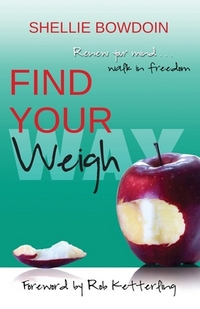Grab a copy from your local indie bookstore!

It’s that time when people are hitting the gym, starting diets, and doing all the sorts of things you do at the beginning of the year to “improve” themselves (seriously, having a hard time getting a parking spot at the gym). So it’s also the time for books on exercise, eating well, wellness in general to come out, enter Find Your Weigh. Bowdoin combines sage advice about eating/food/etc. with spiritual guidance.
When it comes to the Food aspects of the book, this is really good. Bowdain doesn’t try to impress with a lot of statistics, research articles and so on. Instead, she talks about her own experiences and then applies what she learned from them to provide examples for the book. Which isn’t to say that she didn’t do her homework, it’s there, but she doesn’t shove it in the reader’s face.
She covers things like honest expectations, mental blocks, habit formation, and the way to approach it all wisely. She does it in a friendly outgoing voice. She’s full of encouragement. She’s got plenty of tips and tricks to help you think about your weight and the effective ways to deal with it. There’s just so much here that is commendable that it’s hard to get into it all without making anyone getting the book on their own moot.
I’ll admit, if I’d known Bowdoin was going to try to bring the Bible into this, I’d have passed on the book. I have little patience for “Christian” diet books. It’s not that I don’t think the Bible is silent on health/diet/etc., but you’re not going to get much more than a pamphlet out of it, unless you’re going to trace themes about feasting, celebration, prayer, fasting, contentment, and so on then apply them via good and necessary consequence.
But, Bowdoin did bring the Bible up, so I feel compelled to address it. If she used the Scriptures correctly once, I didn’t notice it. And I’m not talking about holding/teaching a disputed idea from an unclear text. I’m talking about wholescale violence to the text and context she cites from. For example, Romans 7 is not about “learned helplessness” or the struggle against impulses to eat less-than-healthy food, it’s about the mortifying of sinful flesh; the discipline in Hebrews 12 is not self-discipline, but correction from our Heavenly Father; and so on.
If you ignore the Biblical citations/applications (and it’s easy to do, I wish I had), this is a really good book. It’s full of the voice of experience, compassion, and common sense. Written in a way that will likely draw you in, and help you to see how you can eat/act healthier. At the very least, it’s worth a glance (and probably more). This isn’t a once-sized-fits-all approach, but a toolbox that will have a lot of what you need to deal with the problem at hand.
Disclaimer: I received a copy of this book from the author in exchange for this post and my honest opinion.

This post contains an affiliate link. If you purchase from it, I will get a small commission at no additional cost to you. As always, opinions are my own.






